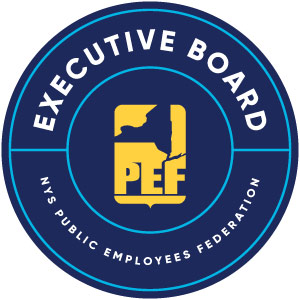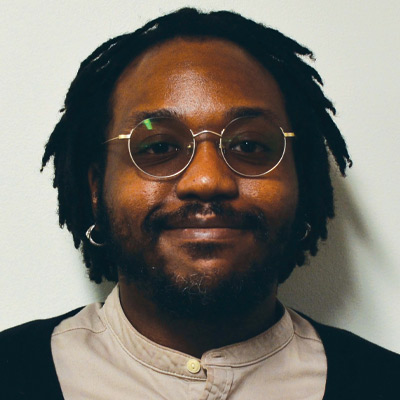
August 7, 2024 — The PEF Executive Board, with 23 new members following the union’s Triennial Election, met for the first time on Aug. 1-2, 2024, in Albany.
 PEF President Wayne Spence thanked members for reelecting him to an historic fourth term and thanked PEF staff for ensuring a smooth election process and getting the executive board up and running.
PEF President Wayne Spence thanked members for reelecting him to an historic fourth term and thanked PEF staff for ensuring a smooth election process and getting the executive board up and running.
“I look forward to working for the next three years for the union and the members’ concerns,” said President Spence.
President highlights COPE contributions, ongoing campaigns
The Committee on Political Education (COPE) is PEF’s political action fund to lobby for federal issues. Contributions made to COPE are completely voluntary and not part of a PEF members’ dues. When President Spence brought up PEF COPE Coordinator Don Morgenstern to deliver an update on the fund, the board was happy to learn that PEF members are more eager this year to get involved.
“We are up over 10 percent since the previous year in contributions,” Morgenstern shared. “And up 12 percent in the amount people contribute.”
The amount per paycheck or per pension check has also increased about six percent.
President Spence told the board that when COPE contributions are made, it not only helps PEF make inroads on the federal level, it also carries an added benefit with one of PEF’s international parent unions, SEIU, which sets goals for its affiliate unions and gives rebates when those goals are met.
“We are about $2,000 away from getting that SEIU rebate,” President Spence said. “When we meet that goal, or go beyond it, we will get a portion of that money back from SEIU. And we are well on our way to doing just that.”
President Spence also detailed PEF’s campaigns to keep SUNY Downstate open and to stand strong in the face of bullying at Kingsboro Psychiatric Center in Brooklyn.
The SUNY Downstate fight has been ongoing since PEF first learned about the State’s plan to transition services from the state hospital to King’s County Hospital in January. PEF immediately partnered with United University Professions (UUP) to form a coalition in order to make the case to elected politicians and the public how critical it is to the community that Downstate stay open.
That coalition – Brooklyn Needs Downstate – was able to halt the plan until at least April 1, 2025, when an advisory panel formed by the governor must issue recommendations on how to revitalize and sustain Downstate. Organized labor will have one seat on that panel.
In June, PEF and UUP traveled with local New York City clergy leaders to Washington, D.C. President Spence showed a video from the trip to the board. The group was able to quickly meet with U.S. Speaker of the House Mike Johnson one morning while having breakfast, and more formally with U.S. Rep. Yvette Clarke, whose 9th House District includes SUNY Downstate.
“Pressure must be kept on Governor Hochul,” said President Spence. “But in order for us to keep SUNY Downstate open and not keep doing this fight year after year, there needs to be a significant infusion of cash.”
President Spence said that while everyone is cautiously optimistic, federal help is going to be necessary given the hundreds of millions of dollars it will take for Downstate to modernize and continue delivering specialized health care.
President Spence also highlighted moments from the recent AFT and SEIU conventions, held in Houston and Philadelphia, respectively.
And finally, President Spence invited newly elected PEF Trustee Radhakrishna Mohan and PEF Division 357 (Information Technology Services) Leader Christopher Ford on stage to discuss PEF’s recent IT Summit on Artificial Intelligence (AI). The summit brought together union leaders, politicians, information technology executives and the commissioner of the Department of Civil Service to talk about how to make sure AI is used responsibly and transparently when it comes to public sector jobs.
“We have a chance to make sure that we do something,” said Mohan. “And I thank those of you who were there, President Spence and PEF staff for helping to set this up.”
Convention 2025 and 2026
Vice President Darlene Williams and Assistant Director of Special Events Barbara Corse-Johnson next took to the podium to lead a discussion of site options for the PEF Convention in 2025 and 2026. Last year the Convention was held in Syracuse, and it will be held there again next month, Sept. 15-18, 2024.
Corse-Johnson sent Requests for Proposals (RFPs) to areas across the state and five responded: Albany, Buffalo, Lake Placid, Niagara Falls, and Rochester. Albany and Buffalo are unable to accommodate the union either year, leaving Lake Placid, Rochester and Niagara Falls as the options for the board to consider.
Ultimately, citing heavy downtown construction in Rochester, the board voted to hold the 2025 convention in Lake Placid and the 2026 convention in Niagara Falls.
More information will be made available at a later date regarding both conventions.
Celebrating an historic fourth term
As a surprise to the Executive Board and President Spence, staff from the office of Albany County Executive Daniel McCoy presented President Spence with a proclamation. The proclamation celebrates President Spence for “having a lasting impact on our community and encouraging others to do the same.”
RELATED: Political heavyweights attend PEF Inauguration
Secretary-Treasurer highlights fiscal strength of the union and growth
Secretary-Treasurer Joe Donahue’s report to the executive board showed an increase in union revenue as more members join PEF.
“We have had an increase of about 2,800 new members since June last year,” said Donahue.
Additionally, the Secretary-Treasurer introduced a budget amendment to the executive board. As postage expenses increase across all regions, Donahue requested that the budget amount allocated for mailings be increased by about $20,000 so that regions can continue to communicate with members. The executive board approved the amendment.
At the previous executive board meeting in late May, Secretary-Treasurer Donahue introduced a policy to help facilitate member access to financial records upon request. It was tabled for further discussion until the August meeting. The policy, said Donahue, is meant to increase transparency and accountability between the Secretary-Treasurer and members of the union. It also seeks to protect the union from anti-union actors.
The policy gives PEF staff and the Secretary-Treasurer a minimum of two weeks to produce the requested records and seeks to provide regular access. Requests for financial records must be in writing and the review must be done in-person at PEF headquarters in Latham, N.Y. No pictures or copies will be allowed.
“I want to make sure that members have the ability to request the records they want to review,” said Donahue. “I also want to make sure that the information doesn’t get into the wrong hands.”
The policy was voted on and approved by the executive board.
Political Actions and endorsements
Vice President Randi DiAntonio next discussed the work of PEF’s Statewide Political Action Committee (SWPAC).
Several of PEF’s priorities made it into New York State’s budget, including another fix to Tier 6 of the pension plan – lowering the final average salary calculation from five years to three – and legislation that addresses artificial intelligence regulation as part of the “Legislative Oversight of Automated Decision making in Government” — or LOADinG Act.
The executive board then voted to approve both the state and federal legislative agendas for the union in 2025.
The state agenda includes priorities that focus on PEF’s support for legislation to protect employee rights, pass the Equal Rights Amendment, reform labor law, and improve working conditions and retirement. The federal agenda includes similar priorities, but also details support for transportation funding, the expansion of Medicare and national healthcare insurance, and the Protecting the Right to Organize (Pro) Act.
The executive board also approved endorsements of state and federal candidates, as recommended by PEF’s regional PACs and the SWPAC.
“Endorsements are done on four levels,” said Vice President DiAntonio. “Local, State (Assembly and Senate), the United States Congress and for President.”
PEF makes endorsements based on a candidate’s record of service on issues that matter to PEF and organized labor, as well as their answers during interviews with the union’s various PACs.
After approving endorsements for Congress, the State Assembly and the State Senate, debate began about PEF’s presidential endorsement.
PEF Political Director Leah Gonzalez detailed for the executive board the labor record of both former President Donald Trump and Vice President Kamala Harris. As Vice President, Gonzalez said, Harris cast the tie breaking vote for the American Rescue Plan Act of 2021, which provided more than $12 billion to New York, helping the state avoid layoffs, funding the Healthcare Workforce Bonus Program, and protecting pensions.
“Former President Trump advocated for eliminating pensions for public employees, who he said were overpaid,” said Gonzalez. “His administration filed a brief to the Supreme Court—a friend of the court brief—in support of the Janus decision.”
The SWPAC recommended Vice President Harris be endorsed by PEF, and after some debate, the executive board voted to approve the endorsement.
The next Executive Board meeting will take place Dec. 5-6 in Albany.


